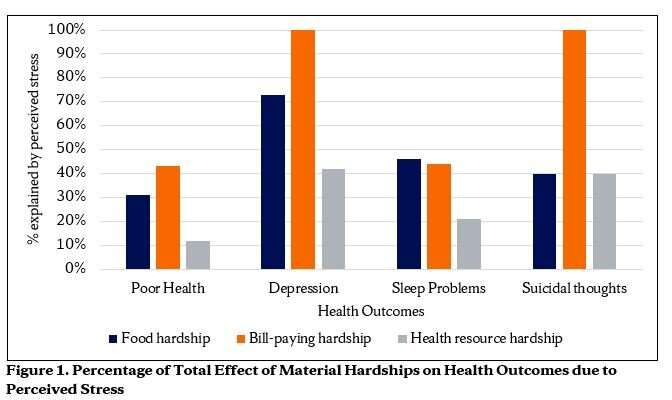
As the United States approaches the one-year anniversary of the start of COVID-19 lockdowns, a new study by researchers from Syracuse University and the University of Texas at San Antonio shows that material hardship—difficulty paying for food, bills and healthcare—is taking a toll on the mental and physical health of young adults.
In the study, “Material hardship, perceived stress, and health in early adulthood,” the researchers found that young adults ages 24-32 who are struggling to meet their basic needs are more likely to report poor health, depression, sleep problems and suicidal thoughts.
According to the Urban Institute’s Health Reform Monitoring Survey, one in three adults have reported experiencing material hardship during the pandemic. For this recent study, material hardship was measured by asking more than 13,300 young adults if they had difficulty paying for food, bills and health care, and to report their stress levels.
“Specifically, they were asked if they worried about running out of food before they had money to get more; had trouble paying utility, phone and rent/mortgage bills; and lacked health insurance or thought they should get medical care but did not,” said Syracuse University professor and research team member Colleen Heflin. “Using this information, we analyzed how hardship and stress levels impact health outcomes, including self-rated health, depression, sleep problems and suicidal thoughts.”

The study was published recently by ScienceDirect’s Annals of Epidemiology and is summarized in this research brief from the Lerner Center for Public Health Promotion and Center for Aging and Policy Studies at Syracuse University. Here are the key findings:
- The likelihood of reporting poor health, depression, sleep problems, and suicidal thoughts is higher for young adults (ages 24-32) who struggle to meet their basic needs than for those who do not.
- The link between poor health outcomes among young adults and difficulty meeting basic needs is largely explained by increased stress levels.
- The relationship between unmet needs and health outcomes in young adulthood remains strong after accounting for background, income, education level, employment status and other factors.
The researchers say policymakers can improve the health of young adults by strengthening social programs that provide access to affordable and quality health care, food and housing.
“Providing short-term emergency assistance and expanding affordable housing could be highly effective methods of reducing stress and improving the health of young adults, especially as the COVID-19 pandemic has left millions of Americans out of work and struggling to meet their basic needs,” Heflin said.
Source: Read Full Article
